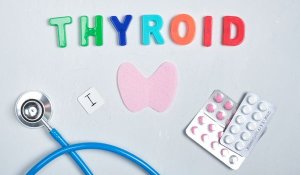
People who think they might have a thyroid problem should see a doctor if their symptoms last more than four weeks or feel very severe. Even younger people can have thyroid issues, particularly if there is a family history of thyroid problems, so screening for them is important, not just in older age.
What is thyroid disease?
Thyroid disease covers a range of conditions that affect the function of the thyroid gland, a small but important part of the body. Symptoms vary depending on the type of thyroid disease. Signs for an underactive thyroid include feeling tired all the time, having sore muscles, or feeling cold even when others aren’t. For an overactive thyroid, some people lose weight quickly, feel their heart racing, or get hot easily, even in summer. Thyroid disease, if not treated, can cause serious health problems, such as trouble swallowing or breathing, issues with the eyes and skin, weaker bones, high cholesterol, high blood pressure, or even heart problems.
What is the thyroid gland?
The thyroid gland is found in the front of the neck, just below the voice box (larynx). It makes three important hormones: T3 (tri-iodothyronine), T4 (thyroxine), and calcitonin. T3 and T4 play a major role in how the body works by helping organs adjust their activity, either speeding up or slowing down as needed. These hormones are responsible for managing things like energy levels, body temperature, metabolism, muscle and bone health, and brain development.
Who is most likely to be affected by thyroid problems?
Women are about five to eight times more likely to be affected by a thyroid condition than men. While scientists aren’t completely sure why this happens, it could have something to do with how the thyroid works with the hormone estrogen.
 What are the different types of thyroid problems?
What are the different types of thyroid problems?
Thyroid problems can be triggered by several different things, such as a lack of iodine in the diet or issues with the immune system.
Underactive thyroid (Hypothyroidism)
Hashimoto’s disease is the main reason people develop an underactive thyroid. Hashimoto’s is a condition where the immune system mistakenly attacks the thyroid gland. This stops the thyroid from making enough of the hormones T3 and T4, which slows down how the body uses energy. Hypothyroidism can also happen for other reasons, like not getting enough iodine, being born with an underdeveloped thyroid, certain medications, or having the thyroid removed.
Symptoms of an underactive thyroid
When someone has an underactive thyroid, they might experience symptoms like gaining weight, feeling tired all the time, or having trouble concentrating. They could also feel unusually cold, have muscle aches, or deal with headaches. Other signs include dry skin, brittle or thinning hair, slow heartbeats, and swelling in the neck from an enlarged thyroid (goiter). Some people also notice heavier periods or issues with constipation.
Thyroid eye disease (TED) is an autoimmune condition that primarily affects the eye muscles and tissues behind the eye. It can cause a range of symptoms, including:
- Eye protrusion or bulging
- Swelling around the eyes
- Redness and irritation
- Double vision
- Dry eyes
Overactive thyroid (Hyperthyroidism)
Graves’ disease is an autoimmune condition and the most common reason people develop hyperthyroidism. It mostly affects women between the ages of 20 and 50. This happens when the thyroid gland overproduces the hormones T3 and T4. The exact cause of Graves’ disease isn’t fully understood, but it might have something to do with taking in too much iodine.
Hyperthyroidism can also be caused by other things, like inflammation in the thyroid (called thyroiditis) or thyroid nodules, which are small lumps that form when thyroid cells grow too much.
Symptoms of an overactive thyroid
An overactive thyroid can cause a variety of symptoms. People might lose weight without trying, feel overly hot or sweat a lot, and experience a fast heartbeat or heart flutters. It can also lead to feelings of anxiety, irritability, or restlessness. Some may have trouble sleeping, feel weak or shaky, or deal with frequent diarrhea. Women might notice changes in their menstrual cycle, such as lighter or less frequent periods, and it could even affect fertility. In some cases, the thyroid gland might swell (called a goiter), or the eyes might appear to bulge outward (exophthalmic goiter).
The challenges of diagnosing thyroid disease 
Many people don’t realize they have a thyroid problem because the symptoms can be unclear and easily mistaken for other issues. For example, women with an overactive thyroid might think they’re going through menopause since they could have lighter or less frequent periods, or even stop having them altogether.
Someone with an underactive thyroid might think their tiredness is just from working too much or believe their weight gain is due to not exercising enough or eating poorly. The symptoms often start slowly and can be hard to notice at first.
Thyroid disease symptoms can look like those of other illnesses, so a blood test is needed to confirm what’s going on. Thyroid tests are simple and can quickly show if there’s a problem or not in most cases.
Treatment of thyroid problems.
The way thyroid disease is treated depends on the specific diagnosis a person receives.
Treating an underactive thyroid
An underactive thyroid can be treated with tablets like Armour thyroid or Synthyroid, which replace the hormones the thyroid isn’t making enough of. These pills are usually taken once a day on an empty stomach and are usually a lifelong treatment. However, treatment isn’t the same for everyone, especially when it comes to dosage regimes, and regular blood tests and dose adjustments may be needed.
Treating an overactive thyroid
An overactive thyroid can be treated in three ways: medication, surgery, or radioactive iodine. Most people with Graves’ disease usually start with medication such as Methimazole, which blocks the thyroid gland from using iodine to make hormones. Treatment typically lasts 12 to 18 months, and leads to a long-term recovery in roughly 50% of cases.
If the thyroid becomes overactive again, a doctor might suggest taking anti-thyroid medicine for a longer time, possibly even for life. Another option could be surgery to remove the thyroid. After that, the person would need to take thyroid hormone medication for the rest of their life.
In some cases, treating an overactive thyroid might include taking a dose of radioactive iodine, which is given as a pill. Radioactive iodine works by destroying the cells in the thyroid gland that produce hormones.
The role of iodine
The body needs iodine from food to make thyroid hormones T3 and T4. The thyroid gland takes iodine from the blood to produce these hormones. Without enough iodine, the body can’t make enough T4, which can be the basic cause of thyroid problems.
Most people have about 20-30 mg of iodine in their body, with over 75% of it stored in the thyroid gland. Adults need about 150 micrograms of iodine a day. Foods like iodized salt, fish, and seaweed are good sources of iodine.
FAQs
What is a thyroid belly?
Thyroid problems can affect weight and body fat. What isn’t always clear is how thyroid issues cause weight changes and the best ways to treat them. Usually, an underactive thyroid (hypothyroidism) causes weight gain, while an overactive thyroid (hyperthyroidism) leads to weight loss. Some people with hypothyroidism also talk about having a “thyroid belly,” which means a bloated or swollen stomach.
What part of the body itches with thyroid problems?
Itching without a clear cause, known as pruritus, is a frequent sign of thyroid issues. It may affect any part of the body but is often most noticeable on the arms, legs, back, and abdomen. The severity can vary, ranging from mild to intense, and the sensation may come and go or persist continuously.
Can low thyroid cause anxiety?
When the thyroid isn’t working properly and slows down, it can throw off the balance of brain chemicals that control mood and stress. One important chemical, GABA, helps calm the nervous system. But when thyroid hormone levels are too low, GABA levels drop, making it harder to relax and increasing the chances of anxiety or panic attacks. Low thyroid function can also affect serotonin, another key brain chemical, which can lead to feeling sad, irritable, or more stressed than usual.
How long does it take to correct thyroid levels?
When someone starts taking thyroid medication, it can take 4 to 6 weeks to notice any changes in their symptoms, though some people might feel better sooner. Others may need their dosage adjusted a few times over several months. It’s important to keep taking the medication and not stop just because improvements aren’t obvious right away.

 What are the different types of thyroid problems?
What are the different types of thyroid problems?












